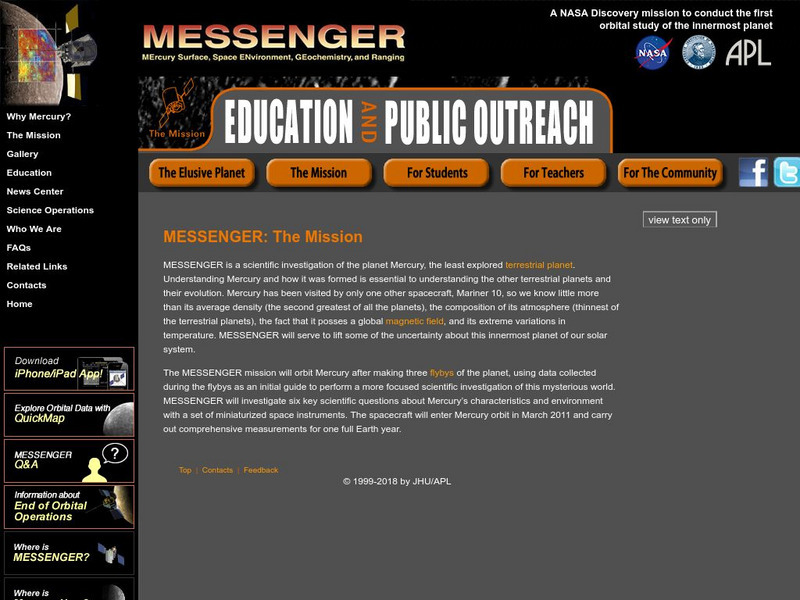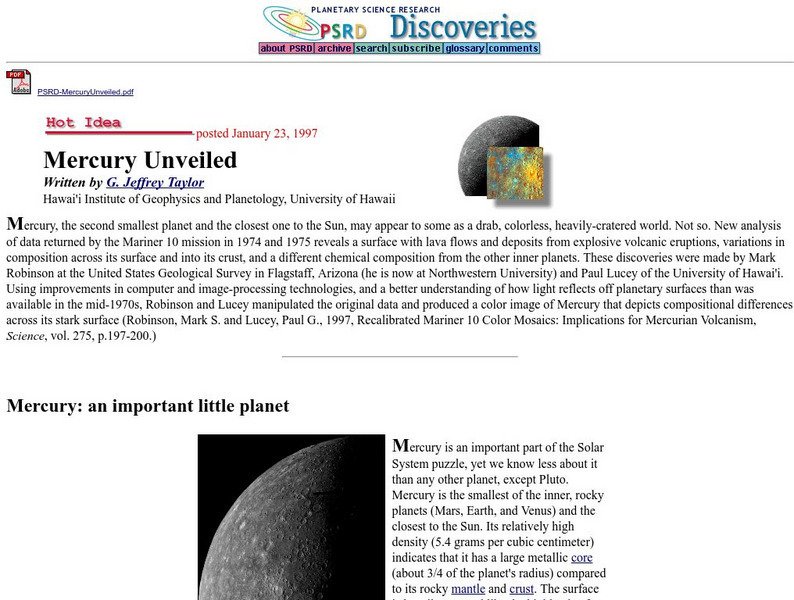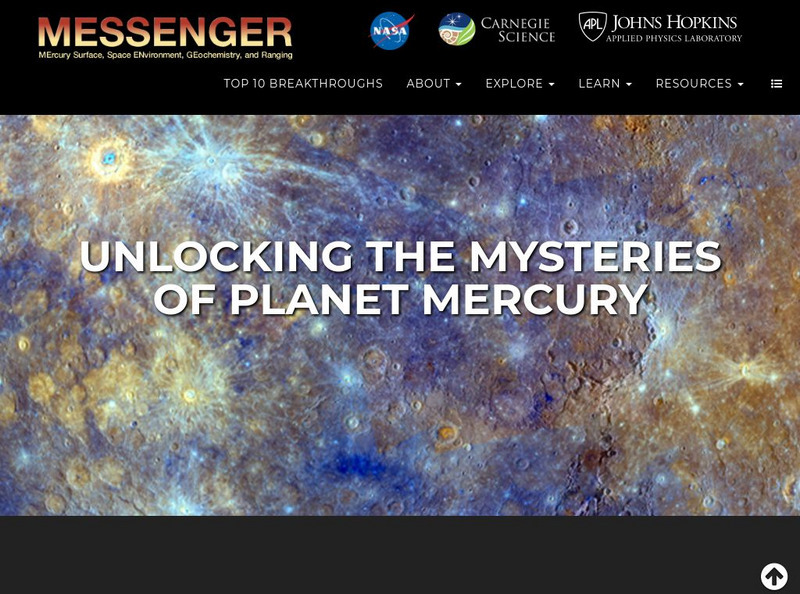Curated OER
The Solar System
In this space worksheet, students identify and locate vocabulary terms related to the Solar System. There are 30 words located in the puzzle.
Curated OER
Why is the Average Temperature Greater on Venus than on Mercury?
Students examine the reasons why the temperature is higher on Venus than on Mercury. In groups, they analzye both planet's atmospheres and determine the rate of global warming on each. They use the internet to research the planets in...
Johns Hopkins University
Nasa: Messenger
This comprehensive website has lots of resources to help you understand Messenger, Nasa's space probe to Mercury. Everything from the purpose of the mission to the structure of Mercury can be found here.
California Institute of Technology
Cool Cosmos: Ask an Astronomer
Resource compiles a list of most frequently asked questions about Mercury. Each question is linked to an astronomer's answer. Kids can explore many aspects of this wonderful planet.
Exploratorium
Exploratorium: A Guide to Astronomy Resources
A portal to resources on the sun, the Earth's neighboring planets, and the weather in space. Find out why Saturn is the "jewel of the Solar System" and explore what happens when Venus and Mercury make their rare transits across the sun.
Florida-Spectrum Environmental Services
Florida Spectrum: Chemical Fact Sheet: Mercury
A great deal of information on the uses and appliactions of mercury, along with some basic data and physical and chemical properties. Very thorough.
University of Hawai'i
University of Hawaii: Mercury Unveiled
New analysis of data returned by the Mariner 10 mission. Includes several photo images. Examines the possibility of volcanism in the history of Mercury and comparisons to Hawaiian and Lunar volcanic events.
NASA
Nasa: Donald "Deke" Slayton Apollo Soyuz Test Project
NASA Web Site about the Apollo-Soyuz Test Project which included Donald "Deke" Slayton, one of the original seven American astronauts. The mission was the first joint Soviet-American space mission. Links are provided to descriptions and...
Harvard University
Harvard University: The Solar System
These hands-on activities are a great way for students to gain perspective on the relative sizes and distances of each planet, the relationship between the sun and Earth, and much more.
Other
State of New Jersey Occupational Health: Mercury
Information on mercury exposure sources, treatments symptoms and tests. Very readable.
Other
Historic Wings: "One Small Step" Race to the Moon
"One Small Step, The Race To The Moon" is a clear presentation of the story of the Moon landing program that the United States conducted during the 1960's and early 1970's. After launching the presentation click on the phases of the Moon...
Other
Historic Wings: John Glenn Friendship 7
The story of America's first astronaut to orbit the earth during the Mercury Space program. After launching the program click on continue or on the numbers to learn about the story of the Mercury program and the first American to orbit...
Encyclopedia of Earth
Encyclopedia of Earth: Mercury
Information about the element, Mercury, atomic number 80. Covers physical and atomic properties, where it is found, and health-related regulations. Also discusses its three main forms, uses for mercury, ways it spreads throughout the...
Dartmouth College
Dartmouth College: Chem Lab: Spectrum of the Hydrogen Atom
In this experiment, you will use a meterstick spectroscope to observe the emission spectrums of hydrogen, sodium, neon, helium, and mercury. Requires Java plug-in.
PBS
Pbs Learning Media: Our Solar System Lithograph Set
View these amazing high-quality images of our solar system from NASA with this lithograph set. Each lithograph contains images, facts, dates, and general information on a particular subject. Background information and teaching tips are...
NASA
Nasa: Great Images in Nasa
Fascinating collection of images from NASA, chosen for their historical or aesthetic significance. Images are searchable by subject, by NASA center, and by keyword, and each is available in three sizes. With links to more information...
US Environmental Protection Agency
Epa: Create a New Climate for Action
The wealth of information and tools available on this site will assist students and teachers to develop and promote active awareness of the impact human beings have on the environment. Resources are provided to guide them in how to lead...
Other
Pollution Probe: Mercury in the Environment [Pdf]
High levels of mercury exposure can cause birth defects, permanent brain or kidney damage, and/or death. This resource focuses on the impacts of mercury in the environment. Learn how mercury can reap havoc on lakes and other aquatic...
Smithsonian Institution
National Air and Space Museum: Exploring the Planets: Our Solar System
Take a tour of our solar system and learn fascinating details and observations about the planets.
Smithsonian Institution
National Air and Space Museum: Exploring the Planets: Mercury
This is a useful resource for facts and images pertaining to the planet Mercury.
Texas Education Agency
Texas Gateway: The Sun Is the Center of the Solar System
See what you know about the solar system by taking this brief interactive quiz and learning module.
NASA
Nasa: Image Science Center: Ask the Space Scientist
A NASA scientist, Dr. Sten Odenwald, answers many students' questions. Topics include planets, galaxies, black holes, the origin of the universe, and common misconceptions about space.
Nine Planets
The Nine Planets: Mercury
A review of information about the planet Mercury, complete with images and explanations.
Johns Hopkins University
Applied Physics Laboratory: Messenger Home
Home page for NASA's Discovery Program Messenger to the planet Mercury. Site provides details of the planned mission, its experiments and the science and management teams. Linked Quicktime animation files are very large and detailed....






















